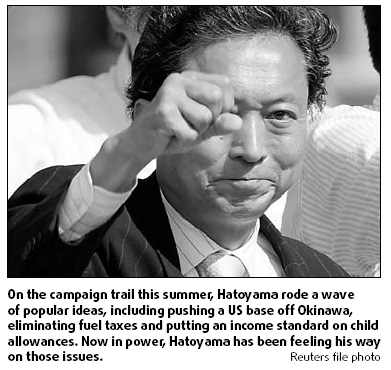Asia-Pacific
Polls suggest Hatoyama may be vulnerable at the helm
By Lei Xiaoxun (China Daily)
Updated: 2009-12-24 08:33
 |
Large Medium Small |
As Japan's prime minister Yukio Hatoyama saw his approval rating dip from more than 70 percent to 48 percent, the lowest since he was inaugurated in September, speculation looms that the ruling Democratic Party of Japan (DPJ) might opt to replace him well ahead of Japan's Upper House election next July.

Winning the election is seen as the paramount goal for DPJ, said Wang Ping, scholar with Chinese Academy of Social Sciences Japanese Studies Institute, therefore, the party may try to get rid of any factor that may 'impair' its winning efforts.
However, a prime minister replacement would be "an extreme scenario", said Zhou Yongsheng, Japan studies professor with China Foreign Affairs University.
And it might take a grave dent on the Sino-Japan relations since Hatoyama is considered to be a "truly sincere statesman to push ahead Sino-Japan friendship", he added.
Given the complexity of Japanese political infighting, such replacement is "very unlikely", said Zhou.
The present support rate, fluctuating around 50 percent (according to Asahi Shimbun), is still considered to be well acceptable in Japanese political history, said Zhou, who compared Hatoyama's popularity to that of Yoshiro Mori, the former Japanese prime minister who refused to resign even when his approval rate sank to as low as 9 percent.
But Hatoyama and his government have a load of hard nuts to crack.
Budget was one challenge that drained many of Hatoyama's supporters.
Although the Democratic Party of Japan is sounding a tough note on the country's budget deficit, credit-rating agencies and investors are skeptical about whether the newcomers to power can curtail the nation's mounting debt, which is said to be disproportionate.
But despite a ballooning national deficit and after wrangling with its junior coalition party members, the DPJ announced recently it would release 7.2 trillion yen ($80.9 billion) as a supplementary budget for the year through March 2010, aimed at boosting Japan's ailing economy.
Hatoyama's cabinet also decided to put a $494 billion cap on capital-raising through issuing state bonds for next year's budget.
| ||||
But with public debt approaching 200 percent of GDP, more than 70 percent of respondents in the surveys carried out by Asahi newspaper said they believed income limits should be set on eligibility for child allowances. However, Hatoyama ruled out such possibility on Monday.
More than half of the survey takers said the gasoline surcharge and taxes should stay in place, contrasting Hatoyama's pre-election pledge to curtail these fees so that consumers can have more money for other spending.
Hatoyama's foreign policy, especially diplomacy with the US, also drew waves of criticism. His approach to maintain the Japan-US partnership but with more autonomy put his administration in a dilemma, said Zhou Yongsheng, Japan studies professor with China Foreign Affairs University.
Up to eight out of ten notable political analysts interviewed by Xinhua contended that while rebuilding and consolidating diplomatic ties in Asia is widely seen as a step forward for Hatoyama, particularly as the global economic landscape starts to shift with China soon to emerge as the world's second largest economy, the DPJ will do well to balance new ties with its existing relationship with the US, rather than prioritizing one over the other.
However, while Japan is working on closer ties with other Asian nations for an "East Asia Community" based on fraternity, it has found hard to implement its new policy to become equal with its long-time alliance as the United States has become accustomed to exerting influence on an LDP-led Japan, analysts noted.
A recent example: With strong opposition from the US on renegotiating the Okinawa military base agreement, the Hatoyama administration announced that any decision regarding the relocating of the US Marine Corps' Futemma Air Station's Heliport functions will be postponed until May.
On a recent visit to Japan, US Secretary of Defense Robert M. Gates delivered Washington's message that re-examining the 2006 US-Japan Roadmap for Realignment and Implementation was not an option. "There really are no alternatives to the arrangement that was negotiated," Gates stated.
As upper house elections approach, the DPJ must be proactive if they hope to consolidate their power, particularly as the party's popularity rating has fallen to below 60 percent for the first time since taking power.
"There is no question that Japan stands at a foreign policy crossroads. The international system is in the midst of a rapid transformation and Japan must adapt its diplomatic strategy to meet the challenges of this new era," said Hitoshi Tanaka, a former Deputy Minister for Foreign Affairs and current senior fellow at the Japan Center for International Exchange.
Hatoyama's political-fund scandal fueled criticism that Hatoyama administration hadn't departed completely from the failing Liberal Democratic Party's corrupt ways. The blame targeted at erroneous donations to his political fund management organization and the nation's response seemed to be, "here we go again."
Essentially, the DPJ, for the good of the nation or otherwise, has spent a great deal of time and effort attempting to differentiate themselves from their predecessors. However, the nation is waiting with increasing impatience to see whether such ideologies will translate into tangible development and action- otherwise known as policies. Due to early issues of transparency and fund scandals, the future credibility of the Hatoyama and his government has already been brought into question.
Xinhua contributed to the story










